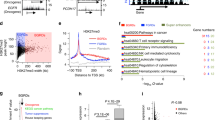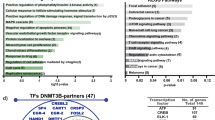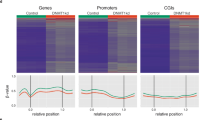Abstract
Methyl-cytosine-phosphate-guanine (CpG)-binding domain (MBD) proteins are bound to hypermethylated promoter CpG islands of tumor suppressor genes in human cancer cells, although a direct causal relationship at the genome-wide level between MBD presence and gene silencing remains to be demonstrated. To this end, we have inhibited the expression of MBD proteins in HeLa cells by short hairpin RNAs; and studied the functional consequences of MBD depletion using microarray-based expression analysis in conjunction with extensive bisulfite genomic sequencing and chromatin immunoprecipitation. The removal of MBDs results in a release of gene silencing associated with a loss of MBD occupancy in 5′-CpG islands without any change in the DNA methylation pattern. Our results unveil new targets for epigenetic inactivation mediated by MBDs in transformed cells, such as the cell adhesion protein γ-parvin and the fibroblast growth factor 19, where we also demonstrate their bona fide tumor suppressor features. Our data support a fundamental role for MBD proteins in the direct maintenance of transcriptional repression of tumor suppressors and identify new candidate genes for epigenetic disruption in cancer cells.
This is a preview of subscription content, access via your institution
Access options
Subscribe to this journal
Receive 50 print issues and online access
$259.00 per year
only $5.18 per issue
Buy this article
- Purchase on Springer Link
- Instant access to full article PDF
Prices may be subject to local taxes which are calculated during checkout






Similar content being viewed by others
References
Bakker J, Lin X, Nelson WG . (2002). Methyl-CpG binding domain protein 2 represses transcription from hypermethylated pi-class glutathione S-transferase gene promoters in hepatocellular carcinoma cells. J Biol Chem 277: 22573–22580.
Ballestar E, Esteller M . (2005). Methyl-CpG-binding proteins in cancer: blaming the DNA methylation messenger. Biochem Cell Biol 83: 374–384.
Ballestar E, Paz MF, Valle L, Wei S, Fraga MF, Espada J et al. (2003). Methyl-CpG binding proteins identify novel sites of epigenetic inactivation in human cancer. EMBO J 22: 6335–6345.
Ballestar E, Ropero S, Alaminos M, Armstrong J, Setien F, Agrelo R et al. (2005). The impact of MECP2 mutations in the expression patterns of Rett syndrome patients. Hum Genet 116: 91–104.
Bernard D, Gil J, Dumont P, Rizzo S, Monte D, Quatannens B et al. (2006). The methyl-CpG-binding protein MECP2 is required for prostate cancer cell growth. Oncogene 25: 1358–1366.
Esteller M . (2007). Cancer epigenomics: DNA methylomes and histone-modification maps. Nat Rev Genet 8: 286–298.
Fatemi M, Wade PA . (2006). MBD family proteins: reading the epigenetic code. J Cell Sci 119 (Part 15): 3033–3037.
Fournier C, Goto Y, Ballestar E, Delaval K, Hever A, Esteller M et al. (2002). Allele-specific histone lysine methylation marks regulatory regions at imprinted mouse genes. EMBO J 21: 6560–6570.
Fraga MF, Ballestar E, Montoya G, Taysavang P, Wade PA, Esteller M . (2003). The affinity of different MBD proteins for a specific methylated locus depends on their intrinsic binding properties. Nucleic Acids Res 31: 1765–1774.
Fujita N, Takebayashi S, Okumura K, Kudo S, Chiba T, Saya H et al. (1999). Methylation-mediated transcriptional silencing in euchromatin by methyl-CpG binding protein MBD1 isoforms. Mol Cell Biol 19: 6415–6426.
Fujita N, Watanabe S, Ichimura T, Tsuruzoe S, Shinkai Y, Tachibana M et al. (2003). Methyl-CpG binding domain 1 (MBD1) interacts with the Suv39h1-HP1 heterochromatic complex for DNA methylation-based transcriptional repression. J Biol Chem 278: 24132–24138.
Fuks F, Hurd PJ, Wolf D, Nan X, Bird AP, Kouzarides T . (2003). The methyl-CpG-binding protein MeCP2 links DNA methylation to histone methylation. J Biol Chem 278: 4035–4040.
Guy J, Hendrich B, Holmes M, Martin JE, Bird A . (2001). A mouse Mecp2-null mutation causes neurological symptoms that mimic Rett syndrome. Nat Genet 27: 322–326.
Hanahan D, Weinberg RA . (2000). The hallmarks of cancer. Cell 100: 57–70.
Hendrich B, Bird A . (1998). Identification and characterization of a family of mammalian methyl-CpG binding proteins. Mol Cell Biol 18: 6538–6547.
Hendrich B, Guy J, Ramsahoye B, Wilson VA, Bird A . (2001). Closely related proteins MBD2 and MBD3 play distinctive but interacting roles in mouse development. Genes Dev 15: 710–723.
Hendrich B, Hardeland U, Ng HH, Jiricny J, Bird A . (1999). The thymine glycosylase MBD4 can bind to the product of deamination at methylated CpG sites. Nature 401: 301–304.
Herman JG, Baylin SB . (2003). Gene silencing in cancer in association with promoter hypermethylation. N Eng J Med 349: 2042–2054.
Herman JG, Graff JR, Myohanen S, Nelkin BD, Baylin SB . (1996). Methylation-specific PCR: a novel PCR assay for methylation status of CpG islands. Proc Natl Acad Sci USA 93: 9821–9826.
Hutchins AS, Mullen AC, Lee HW, Sykes KJ, High FA, Hendrich BD et al. (2002). Gene silencing quantitatively controls the function of a developmental trans-activator. Mol Cell 10: 81–91.
Jones PA, Laird PW . (1999). Cancer epigenetics comes of age. Nat Genet 21: 163–167.
Jones PL, Veenstra GJ, Wade PA, Vermaak D, Kass SU, Landsberger N et al. (1998). Methylated DNA and MeCP2 recruit histone deacetylase to repress transcription. Nat Genet 19: 187–191.
Jordan C, Li HH, Kwan HC, Francke U . (2007). Cerebellar gene expression profiles of mouse models for Rett syndrome reveal novel MeCP2 targets. BMC Med Genet 8: 36.
Klose RJ, Sarraf SA, Schmiedeberg L, McDermott SM, Stancheva I, Bird AP . (2005). DNA binding selectivity of MeCP2 due to a requirement for A/T sequences adjacent to methyl-CpG. Mol Cell 19: 667–678.
Koizume S, Tachibana K, Sekiya T, Hirohashi S, Shiraishi M . (2002). Heterogeneity in the modification and involvement of chromatin components of the CpG island of the silenced human CDH1 gene in cancer cells. Nucleic Acids Res 30: 4770–4780.
Lan MS, Lu J, Goto Y, Notkins AL . (1994). Molecular cloning and identification of a receptor-type protein tyrosine phosphatase, IA-2, from human insulinoma. DNA Cell Biol 13: 505–514.
Lewis JD, Meehan RR, Henzel WJ, Maurer-Fogy I, Jeppesen P, Klein F et al. (1992). Purification, sequence, and cellular localization of a novel chromosomal protein that binds to methylated DNA. Cell 69: 905–914.
Lopez-Serra L, Ballestar E, Fraga MF, Alaminos M, Setien F, Esteller M . (2006). A profile of methyl-CpG binding domain protein occupancy of hypermethylated promoter CpG islands of tumor suppressor genes in human cancer. Cancer Res 66: 8342–8346.
Magdinier F, Wolffe AP . (2001). Selective association of the methyl-CpG binding protein MBD2 with the silent p14/p16 locus in human neoplasia. Proc Natl Acad Sci USA 98: 4990–4995.
Nan X, Ng HH, Johnson C, Laherty CD, Turner BM, Eisenman RN et al. (1998). Transcriptional repression by the methyl-CpG-binding protein MeCP2 involves a histone deacetylase complex. Nature 393: 386–389.
Ng HH, Jeppesen P, Bird A . (2000). Active repression of methylated genes by the chromosomal protein MBD1. Mol Cell Biol 20: 1394–1406.
Ng HH, Zhang Y, Hendrich B, Johnson CA, Turner BM, Erdjument-Bromage H et al. (1999). MBD2 is a transcriptional repressor belonging to the MeCP1 histone deacetylase complex. Nat Genet 23: 58–61.
Nguyen CT, Gonzales FA, Jones PA . (2001). Altered chromatin structure associated with methylation-induced gene silencing in cancer cells: correlation of accessibility, methylation, MeCP2 binding and acetylation. Nucleic Acids Res 29: 4598–4606.
Olski TM, Noegel AA, Korenbaum E . (2001). Parvin, a 42 kDa focal adhesion protein, related to the alpha-actinin superfamily. J Cell Sci 114: 525–538.
Saito M, Ishikawa F . (2002). MBD3 and HDAC1, two components of the NuRD complex, are localized at Aurora-A-positive centrosomes in M phase. J Biol Chem 277: 35434–35439.
Sansom OJ, Berger J, Bishop SM, Hendrich B, Bird A, Clarke AR . (2003). Deficiency of Mbd2 suppresses intestinal tumorigenesis. Nat Genet 34: 145–147.
Wade PA, Gegonne A, Jones PL, Ballestar E, Aubry F, Wolffe AP . (1999). Mi-2 complex couples DNA methylation to chromatin remodelling and histone deacetylation. Nat Genet 23: 62–66.
Yin W, Smiley E, Germiller J, Mecham RP, Florer JB, Wenstrup RJ et al. (1995). Isolation of a novel latent transforming growth factor-beta binding protein gene (LTBP-3). J Biol Chem 270: 10147–10160.
Zhao X, Ueba T, Christie BR, Barkho B, McConnell MJ, Nakashima K et al. (2003). Mice lacking methyl-CpG binding protein 1 have deficits in adult neurogenesis and hippocampal function. Proc Natl Acad Sci USA 100: 6777–6782.
Acknowledgements
We are grateful to Professor Reinhard Fässler for providing us with the PARVG antibody. The work was supported by the Health (FIS01-04) and Education and Science (I+D+I MCYT08-03, FU2004-02073/BMC and Consolider MEC09-05) Departments of the Spanish Government, the European Grant Transfog LSHC-CT-2004-503438 and the Spanish Association Against Cancer (AECC). LL-S is a recipient of a BEFI predoctoral fellowship.
Author information
Authors and Affiliations
Corresponding author
Additional information
Supplementary Information accompanies the paper on the Oncogene website (http://www.nature.com/onc).
Rights and permissions
About this article
Cite this article
Lopez-Serra, L., Ballestar, E., Ropero, S. et al. Unmasking of epigenetically silenced candidate tumor suppressor genes by removal of methyl-CpG-binding domain proteins. Oncogene 27, 3556–3566 (2008). https://doi.org/10.1038/sj.onc.1211022
Received:
Revised:
Accepted:
Published:
Issue Date:
DOI: https://doi.org/10.1038/sj.onc.1211022
Keywords
This article is cited by
-
MeCP2 and the enigmatic organization of brain chromatin. Implications for depression and cocaine addiction
Clinical Epigenetics (2016)
-
Preconception Alcohol Increases Offspring Vulnerability to Stress
Neuropsychopharmacology (2016)
-
Transcriptome analysis in calorie-restricted rats implicates epigenetic and post-translational mechanisms in neuroprotection and aging
Genome Biology (2015)
-
Expression profiling of DNA methylation-mediated epigenetic gene-silencing factors in breast cancer
Clinical Epigenetics (2014)
-
Epigenetic Regulation of Organic Anion Transporting Polypeptide 1B3 in Cancer Cell Lines
Pharmaceutical Research (2013)



